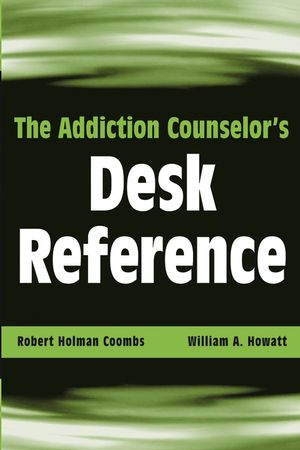The Addiction Counselor's Desk ReferenceISBN: 978-0-471-43245-6
Paperback
432 pages
February 2005
 This is a Print-on-Demand title. It will be printed specifically to fill your order. Please allow an additional 10-15 days delivery time. The book is not returnable.
|
||||||
Preface xvii
Acknowledgments xxi
Part I: Abused Substances and their Effects
Abused drugs 2
Opiates 2
Depressants 4
Stimulants 7
Cannabis 9
Hallucinogens 10
Inhalants 12
Steroids (Anabolic-Androgenic ) 12
Designer drugs 13
Control schedules for Abused drugs 15
Prescribing drugs 30
The five control schedules 30
Controlled substance analogues 32
Government decision making 32
Part II: Conceptual tools
Definitions of addiction 35
Moral model 35
Self-medication model 35
Medical/disease model 36
Spirituality model 36
Impulse-control disorder 36
Reward deficiency and Neurophysiological adaption 37
Genetic model 37
Biomedical model 37
Social learning model 38
Erroneous thought pat terns 38
Biopsychosocial model 38
Public health model 39
Characteristics of addiction 39
Compulsive use 40
Loss of control 40
Continued use despite adverse consequences 40
Tolerance 40
Withdrawal 41
Types of addictive disorders 41
The brain and psychoactive drugs 41
The brain and addictive behaviors 42
Addictive interaction disorder 45
Drug-use stages 46
Initiation 46
Escalation 47
Maintenance 47
Discontinuation and Relapse 47
Recovery 48
Levels of drug use 49
Type 1—Abstainers 50
Type 2—Social users 50
Type 3—Drug abusers 51
Type 4—Physically but not Psychologically dependent users 51
Type 5—Physically and Psychologically dependent users 52
Stages of behavioral change 53
Stage 1—Precontemplation 53
Stage 2—Contemplation 54
Stage 3—Preparation 54
Stage 4—Action 55
Stage 5—Maintenance and Relapse prevention 55
Stage 6—Termination 55
Prevention types and principles 56
The traditional classification 56
The institute of medicine classification 57
Prevention principles 57
Relapse prevention 59
Part III: Treatment planning and Assessment resources
Treatment planning 64
Competencies and goals 64
Screening and Assessment 65
Diagnostic summary 67
Treatment 68
Client placement criteria 68
Writing a treatment plan 69
Sample treatment plan 70
Levels of care 71
Assessment resources 75
Alcohol Assessment instruments 75
Other Drug Assessments 81
Nonchemical addictions 84
Mental health (dual diagnosis) Assessments 85
Recovery potential Assessments 89
Multiple measures resources 93
Dual diagnoses: Psychiatric illness with addiction 93
The diagnostic and statistical manual (Dsm-Iv-Tr) 94
Psychiatric diagnostic categories 94
Part IV: Clinical skills and resources
Clinical models 102
Sizgmund Freud’s psychoanalytic therapy 102
Carl G. Jung’s analytic psychoanalysis 103
Alfred Adler’s individual psychology 103
Carl Rogers’s person-centered therapy 104
Fritz Perls’s Gestalt therapy 104
Irvin Yalom’s existential psychotherapy 105
Viktor Frankl’s logotherapy 106
Albert Ellis’s rational-emotive behavior therapy 106
William Glasser’s choice theory and Reality therapy 107
Aaron Beck’s cognitive behavioral therapy 108
Eric Berne’s transactional analysis 108
Other behavioral approaches 109
Counseling techniques 109
Clinical microskills 115
Client homework exercises 117
Client health and Stress management 131
Nutritional counseling 131
Exercise counseling 132
Affect-regulation coping skills counseling 132
Stress-management training 134
Shaffer coping models 135
Common styles of negative self-talk 137
Rewriting old beliefs 138
Rewriting irrational beliefs 139
Part V: Treatment resources
Addiction recovery tools 142
Motivational tools 142
Medical and pharmaceutical tools 143
Cognitive-behavioral tools 146
Psychosocial tools 148
Holistic tools 150
Addiction Recovery programs 153
Residential and outpatient treatment programs 153
Support groups 155
Recovery programs for selected populations 167
Harm reduction programs 181
Characteristics of Harm reduction programs 183
Harm reduction goals 183
Harm reduction techniques 184
Other Harm reduction techniques 186
Part VI: Professional management
Record keeping 190
Crisis management 206
Crisis types 206
Crisis reactions 207
Crisis management goals 207
Crisis intervention principles 207
Crisis management steps 208
Chronically relapsing clients 208
Difficult Clients 209
Safety issues 210
When threats occur 211
Clients with weapons 212
Clients who appear dangerous to self 212
Suicide Prevention 213
Critical incident Stress debriefing 213
Legal and Ethical responsibilities 214
Universal professional values 214
Ethical codes 215
Ethical decision making 216
Confidentiality 216
Informed consent 217
Dual relationships 217
Duty to warn 217
Referral obligation 218
Rights of minors 218
Malpractice 218
Ethical dilemmas 219
Part VII: Career enhancement resources
Educational resources 222
Basic knowledge, skills, and attitudes expected of Addiction counselors 222
Selecting a training program 228
Certification and licensing 232
Continuing education 245
Business plan 248
Setting fees 248
Discussing fees 249
Home-based practices 249
Referrals 250
Multidisciplinary teams 251
Wellness plan 251
Burnout 251
Avoiding burnout 252
Malpractice insurance 253
Part VIII: Information resources
National and International organizations 258
Federal substance abuse agencies 258
Regional substance abuse agencies 266
State substance abuse agencies 266
Educational and training institutions 279
Professional addiction-related organizations 286
Canadian agencies 299
International substance abuse organizations 303
Grassroots alcohol and other Drugs Information 307
Grant-funding resources 309
Federal granting agencies 309
International granting agencies 310
Private granting agencies 311
Other funding databases 313
Publishing resources 314
Academic and professional journals 314
Addiction magazines and websites 336
Addiction newsletters and websites 341
Drug policy advocates 346
The Drug policy alliance 347
National organization for the reform of Marijuana laws 347
Harm reduction coalition 347
Law enforcement against prohibition 348
Multidisciplinary association for Psychedelic studies 348
Religious leaders for a more just and Compassionate Drug policy 348
Educators for sensible Drug policy 349
Canadian foundation for Drug policy 349
Glossary 353
References 381
Author Index 395
Subject Index 401



